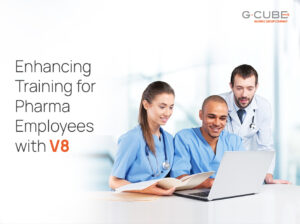Today, technological advancement is the primary driving force behind competitive success. The modern LMS technology provides avenues to deliver and manage relevant training courses. The top learning management systems offer on-demand training and efficiently track employee performance. These also generate automatic reports and certificates of participation, thereby saving massive amounts of time and money.
Enterprises, whether big or small, deploy top LMS systems to meet diverse training goals including onboarding, sales, compliance, soft skills training, and more. Consequently, modern LMS drives workforce engagement, knowledge retention, accelerates business performance, and overall training impact. Learning activities are evolving at a rapid pace across the globe. There are various paradigms for seeking knowledge or learning something new. The new-age learners are leaning towards modern LMSs to align the right kind of learning with pertinent business needs. In today’s digital era, selecting the best corporate eLearning platform is crucial for any organization. Let us discuss top LMS features which cater to the personalized learning needs of all:
User management
The Top learning management systems assign different roles as learner, administrator, manager, and trainer. The admin is top-level user who manages user profiles, assigns courses, and customize themes as per the pertinent learning styles and preferences. While learners can access the system dashboard showing details on course completion, training progress, upcoming training, certifications, training calendar, and more.
Gamification
It is all about incorporating badges, scores, and leaderboards into existing e-learning strategy. Incorporation of levels, progress bars, points, and leaderboards help to engage and encourage modern learners. The robust eLearning platforms support gamification features to analyze learners’ progress, determine training goals, and increase ROIs.
Assessment Engine
Modern learning management system features an assessment engine to analyze learner performance and give real-time feedback. It enables administrators to provide assessments comprising of different question formats such as multiple-choice questions, true/false, match the following, and more. Based on individual responses and overall scores, the LMS provides immediate feedback on how well learners are performing.
Skill-gap analysis
Top LMSs map workforce competencies to personalized training needs and performance goals. Based on an employee’s job profile, role, learning styles, and preferences, the LMS identifies skills as well as performance gaps. As a result, the system automatically assigns relevant training to address such gaps, thereby enabling employees to learn more and perform better.
KPI-driven Automated Learning
The robust LMS technology supports KPI-linked learning approach by integrating with Sales Performance Systems, Human Resource Information Systems, and others. The LMS fetches data from other systems to create Key Performance Indicators (KPIs) and collate individual performance metrics. The KPI dashboard helps to analyze KPI data and automatically assign relevant e-courses as per the personalized needs of all. Consequently, this aids to boost workforce performance, bridge skills-gaps, and drive lucrative training outcomes.
Top learning management systems support above-discussed features, thereby driving engagement and knowledge retention. The proprietary G-Cube LMS delivers innovative eLearning solutions to meet diverse training demands of multiple industries from healthcare and automobile to retail, education, and others. An intuitively designed G-Cube LMS supports built-in features to drive learner engagement, retention, and organizational performance. Also, G-Cube LMS is reckoned under the coveted Top 50 LMS Listing 2019 by Craig Weiss. To know LMS pricing and more, you can request for a personal demo, click here.








